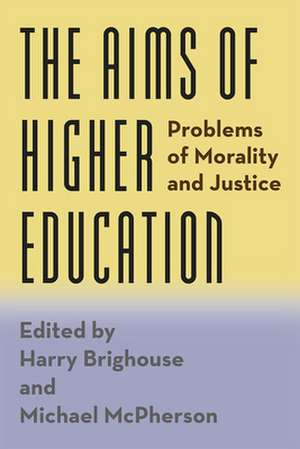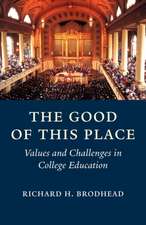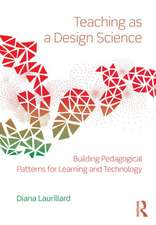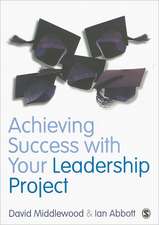The Aims of Higher Education: Problems of Morality and Justice: Emersion: Emergent Village resources for communities of faith
Editat de Harry Brighouse, Michael McPhersonen Limba Engleză Paperback – 18 mai 2015
In this book, philosopher Harry Brighouse and Spencer Foundation president Michael McPherson bring together leading philosophers to think about some of the most fundamental questions that higher education faces. Looking beyond the din of arguments over how universities should be financed, how they should be run, and what their contributions to the economy are, the contributors to this volume set their sights on higher issues: ones of moral and political value. The result is an accessible clarification of the crucial concepts and goals we so often skip over—even as they underlie our educational policies and practices.
The contributors tackle the biggest questions in higher education: What are the proper aims of the university? What role do the liberal arts play in fulfilling those aims? What is the justification for the humanities? How should we conceive of critical reflection, and how should we teach it to our students? How should professors approach their intellectual relationship with students, both in social interaction and through curriculum? What obligations do elite institutions have to correct for their historical role in racial and social inequality? And, perhaps most important of all: How can the university serve as a model of justice? The result is a refreshingly thoughtful approach to higher education and what it can, and should, be doing.
The contributors tackle the biggest questions in higher education: What are the proper aims of the university? What role do the liberal arts play in fulfilling those aims? What is the justification for the humanities? How should we conceive of critical reflection, and how should we teach it to our students? How should professors approach their intellectual relationship with students, both in social interaction and through curriculum? What obligations do elite institutions have to correct for their historical role in racial and social inequality? And, perhaps most important of all: How can the university serve as a model of justice? The result is a refreshingly thoughtful approach to higher education and what it can, and should, be doing.
Din seria Emersion: Emergent Village resources for communities of faith
-
 Preț: 144.99 lei
Preț: 144.99 lei -
 Preț: 133.99 lei
Preț: 133.99 lei - 9%
 Preț: 352.50 lei
Preț: 352.50 lei -
 Preț: 146.50 lei
Preț: 146.50 lei -
 Preț: 208.32 lei
Preț: 208.32 lei -
 Preț: 156.84 lei
Preț: 156.84 lei -
 Preț: 115.53 lei
Preț: 115.53 lei -
 Preț: 548.71 lei
Preț: 548.71 lei - 8%
 Preț: 346.31 lei
Preț: 346.31 lei - 8%
 Preț: 360.28 lei
Preț: 360.28 lei -
 Preț: 216.90 lei
Preț: 216.90 lei -
 Preț: 101.43 lei
Preț: 101.43 lei -
 Preț: 215.52 lei
Preț: 215.52 lei -
 Preț: 185.37 lei
Preț: 185.37 lei - 8%
 Preț: 563.24 lei
Preț: 563.24 lei -
 Preț: 179.04 lei
Preț: 179.04 lei -
 Preț: 106.35 lei
Preț: 106.35 lei -
 Preț: 138.81 lei
Preț: 138.81 lei -
 Preț: 273.93 lei
Preț: 273.93 lei -
 Preț: 127.89 lei
Preț: 127.89 lei - 9%
 Preț: 353.24 lei
Preț: 353.24 lei -
 Preț: 176.49 lei
Preț: 176.49 lei -
 Preț: 94.22 lei
Preț: 94.22 lei -
 Preț: 144.80 lei
Preț: 144.80 lei -
 Preț: 126.25 lei
Preț: 126.25 lei -
 Preț: 67.35 lei
Preț: 67.35 lei -
 Preț: 163.52 lei
Preț: 163.52 lei -
 Preț: 138.26 lei
Preț: 138.26 lei -
 Preț: 182.98 lei
Preț: 182.98 lei - 18%
 Preț: 502.35 lei
Preț: 502.35 lei - 18%
 Preț: 2261.34 lei
Preț: 2261.34 lei -
 Preț: 279.55 lei
Preț: 279.55 lei -
 Preț: 116.07 lei
Preț: 116.07 lei -
 Preț: 208.55 lei
Preț: 208.55 lei -
 Preț: 167.85 lei
Preț: 167.85 lei -
 Preț: 160.63 lei
Preț: 160.63 lei -
 Preț: 183.89 lei
Preț: 183.89 lei - 9%
 Preț: 352.77 lei
Preț: 352.77 lei -
 Preț: 307.55 lei
Preț: 307.55 lei - 12%
 Preț: 290.56 lei
Preț: 290.56 lei - 8%
 Preț: 311.68 lei
Preț: 311.68 lei -
 Preț: 120.81 lei
Preț: 120.81 lei -
 Preț: 229.92 lei
Preț: 229.92 lei - 6%
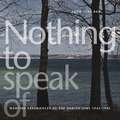 Preț: 324.95 lei
Preț: 324.95 lei -
 Preț: 145.41 lei
Preț: 145.41 lei -
 Preț: 152.07 lei
Preț: 152.07 lei -
 Preț: 186.09 lei
Preț: 186.09 lei - 18%
 Preț: 348.59 lei
Preț: 348.59 lei -
 Preț: 302.76 lei
Preț: 302.76 lei - 8%
 Preț: 565.01 lei
Preț: 565.01 lei
Preț: 219.92 lei
Nou
Puncte Express: 330
Preț estimativ în valută:
42.08€ • 43.94$ • 34.75£
42.08€ • 43.94$ • 34.75£
Carte tipărită la comandă
Livrare economică 16-30 aprilie
Preluare comenzi: 021 569.72.76
Specificații
ISBN-13: 9780226259482
ISBN-10: 022625948X
Pagini: 192
Ilustrații: 2 line drawings
Dimensiuni: 152 x 229 x 8 mm
Greutate: 0.23 kg
Ediția:1
Editura: University of Chicago Press
Colecția University of Chicago Press
Seria Emersion: Emergent Village resources for communities of faith
ISBN-10: 022625948X
Pagini: 192
Ilustrații: 2 line drawings
Dimensiuni: 152 x 229 x 8 mm
Greutate: 0.23 kg
Ediția:1
Editura: University of Chicago Press
Colecția University of Chicago Press
Seria Emersion: Emergent Village resources for communities of faith
Notă biografică
Harry Brighouse is professor of philosophy at the University of Wisconsin–Madison. He is the author of several books, including School Choice and Social Justice and On Education, and is, most recently, coauthor of Family Values: The Ethics of Parent-Child Relationships. Michael McPherson is president of the Spencer Foundation and was previously the president of Macalester College in St. Paul. Prior to that he was professor of economics, chairman of the Economics Department, and dean of faculty at Williams College. He is coauthor or editor of several books, including Economic Analysis, Moral Philosophy, and Public Policy and cofounder of the journal Economics and Philosophy.
Cuprins
Harry Brighouse and Michael McPherson
One/ Introduction: Problems of Morality and Justice in Higher Education
Amy Gutmann
Two/ What Makes a University Education Worthwhile?
Christopher Bertram
Three/ Defending the Humanities in a Liberal Society
Paul Weithman
Four/ Academic Friendship
Kyla Ebels-Duggan
Five/ Autonomy as Intellectual Virtue
Allen Buchanan
Six/ Education and Social Moral Epistemology
Lionel K. McPherson
Seven/ Righting Historical Injustice in Higher Education
Erin I. Kelly
Eight/ Modeling Justice in Higher Education
Harry Brighouse and Michael McPherson
Nine/ Conclusion: Future Research on Values in Higher Education
Acknowledgments
Contributors
Index
One/ Introduction: Problems of Morality and Justice in Higher Education
Amy Gutmann
Two/ What Makes a University Education Worthwhile?
Christopher Bertram
Three/ Defending the Humanities in a Liberal Society
Paul Weithman
Four/ Academic Friendship
Kyla Ebels-Duggan
Five/ Autonomy as Intellectual Virtue
Allen Buchanan
Six/ Education and Social Moral Epistemology
Lionel K. McPherson
Seven/ Righting Historical Injustice in Higher Education
Erin I. Kelly
Eight/ Modeling Justice in Higher Education
Harry Brighouse and Michael McPherson
Nine/ Conclusion: Future Research on Values in Higher Education
Acknowledgments
Contributors
Index
Recenzii
“This is an ambitious volume, providing valuable philosophical tools to tackle three critical policy questions within higher education: What should the content of curricula and pedagogies be? Who should have access to college education? And what should be the relationship between higher education and broader society?”
“In this book, Brighouse and McPherson marshal leading philosophers to discuss not just the usual economic benefits of higher education (though that notion figures into most of the discussions) but also how morality and justice fit into it. Amy Gutmann, renowned for her extraordinary book Democratic Education (1987), begins the analysis by making a case for the liberal arts as necessary for any pre-professional education. Along the same line, the humanities are defended by other contributors as necessary for understanding the purpose and function of education. The contributors’ observations are lively, not defensive, and they do not require an either/or commitment. Other contributors in the volume emphasize developing definite character traits and skills in students and helping students learn which experts to trust; they also emphasize the need for student and faculty diversity—not just for signaling justice but for epistemological uses as well. Contributors also highlight the obligation that elite, private colleges (represented by most of the contributors, though they believe their suggestions fit public colleges as well) must ‘contribute to corrective justice.’ The book concludes with suggestions for future research on values in higher education. . . . Recommended”
